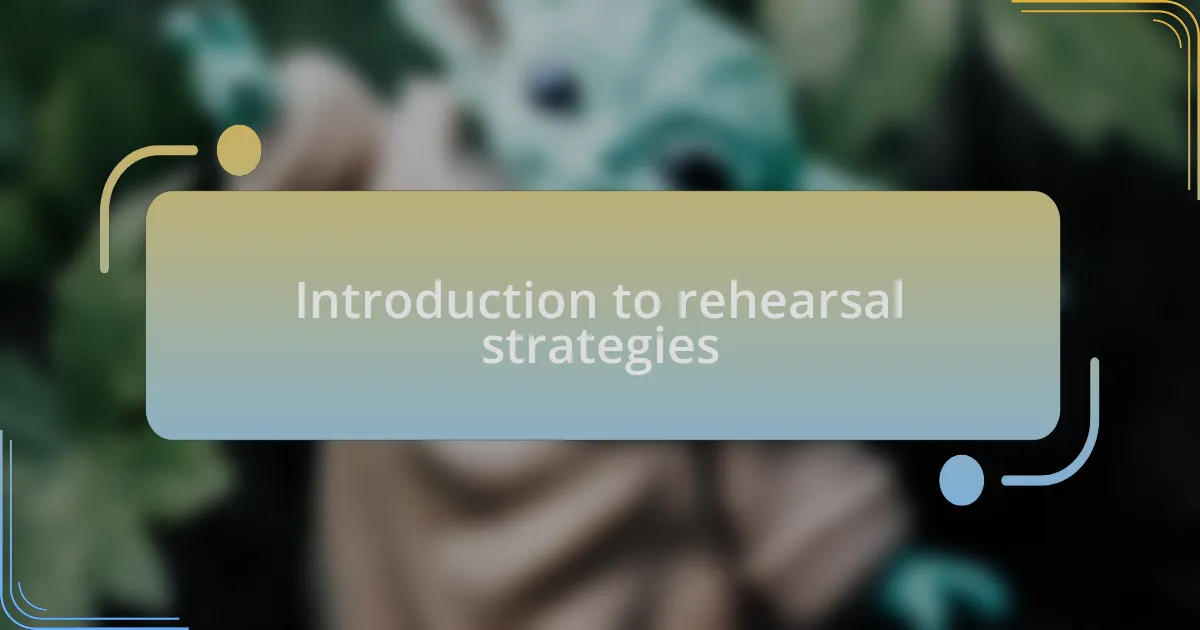Key takeaways:
- Effective rehearsals enhance creativity, foster actor chemistry, and allow the material to evolve through experimentation and feedback.
- Clear communication of goals, establishing a structured timeline, and encouraging spontaneity are essential elements of rehearsal planning.
- Adapting rehearsal strategies to the emotional tone of scenes—whether exploring backstories for drama or promoting playfulness for comedy—can significantly enhance performances.
- Overcoming challenges such as anxiety, creative clashes, and time constraints can be managed through open dialogue, grounding exercises, and a focus on key scene beats.

Introduction to rehearsal strategies
Effective rehearsals are the backbone of a successful film production. I remember one particularly intense rehearsal session where the energy in the room transformed a simple line reading into something profoundly moving. Why is it that we sometimes overlook this vital phase before filming?
When I first started, I was skeptical about the value of rehearsals. Yet, there was a moment when the cast began to experiment with their characters, and I witnessed the script come alive. This experience taught me that rehearsals are not just about memorizing lines; they are about deepening connections among cast members and exploring the emotional arcs of the story.
Adopting specific strategies for rehearsals can enhance creativity and performance. I’ve found that balancing structured exercises with open improvisation allows actors to discover layers in their characters. Have you ever watched a scene play out differently because of unique choices made during rehearsal? That’s the magic of refining a performance, and it often leads to unexpected brilliance on screen.

Importance of effective rehearsals
Effective rehearsals create a safe environment for actors to step out of their comfort zones. I recall a rehearsal where one actor hesitated to express vulnerability in a pivotal scene. By the end, after some direction and encouragement, he delivered a performance that brought tears to everyone’s eyes. Isn’t it incredible how a supportive atmosphere can unlock the depths of a character?
Moreover, rehearsals foster chemistry between cast members, an essential ingredient for a believable performance. I remember a film where two leads initially struggled to connect. With each rehearsal, their interactions grew more genuine, leading to a final product that felt authentic and relatable. Do you see how those moments of trial and error during practice often pave the way for on-screen magic?
Additionally, effective rehearsals allow for the material itself to evolve. In my experience, receiving feedback and adjusting performances can yield surprises that enhance the narrative. One time, a simple change in blocking opened up the scene, establishing a new emotional layer that enriched the overall story. Isn’t it fascinating how the rehearsal process can turn a script into a living, breathing entity?

Key elements of rehearsal planning
Effective rehearsal planning involves clear communication of goals and expectations. I remember one specific instance where the director laid out a detailed vision for the scene, including emotional beats and character motivations. This clarity transformed our approach, enabling everyone to focus on bringing those intentions to life, rather than feeling lost or unsure. Have you ever been part of a rehearsal where the direction wasn’t clear? It can feel chaotic, right?
Another key element is establishing a structured timeline. In a past production, we created a rehearsal schedule that balanced intensive practice with sufficient breaks. This not only prevented burnout but also allowed us to build momentum over time. We’ve all felt the fatigue of endless hours without rest—how refreshing it is when there’s a clear rhythm to the process!
Lastly, fostering a spirit of experimentation is vital. One time, during a rehearsal, I encouraged an actor to improvise a line far outside their comfort zone. Remarkably, that unscripted moment led to a new, powerful direction for the character, breathing life into the performance in a way the script hadn’t anticipated. Isn’t it amazing how those moments of spontaneity can elevate the entire production?

Adapting rehearsals for different scenes
When adapting rehearsals for different scenes, it’s crucial to tailor the approach based on the emotional tone and complexity of each moment. I once worked on a dramatic scene that required a delicate balance between tension and vulnerability. Instead of the usual memorization techniques, we spent our rehearsal time exploring the characters’ backstories, which helped the actors connect more intimately with their roles. Have you noticed how deepening character insights can transform a performance?
In lighter scenes, I find it beneficial to create a playful atmosphere that encourages improvisation and spontaneity. During a comedic rehearsal, we played a series of improv games that loosened up the actors and sparked unexpected bursts of humor. I still recall the laughter that erupted when a simple line took an unexpected turn, becoming a highlight of the scene. Isn’t it fascinating how humor often arises from the most unplanned moments?
For action sequences, precision and coordination are key. In one project, we meticulously mapped out every movement, ensuring safety and clarity. This level of detail resulted in a well-rehearsed choreography that not only looked impressive but also felt natural on screen. Reflecting on that experience, I realized that preparing for an action scene is akin to practicing a dance—how intuitive the performers became, flowing seamlessly through their roles. Don’t you agree that preparation can often lead to the most serendipitous outcomes?

Personal experiences with rehearsal challenges
Rehearsals can sometimes be fraught with unexpected challenges. I remember one particularly chaotic day where an actor struggled with anxiety before stepping into their role. Recognizing this, we paused to engage in a grounding exercise together, which not only calmed their nerves but fostered a deeper sense of trust within the cast. Have you ever witnessed how vulnerability can lead to stronger connections in a performance?
Another hurdle I’ve faced is the occasional clash of creative visions among cast members. In one rehearsal, differing interpretations of a pivotal scene led to frustration and confusion. I initiated a roundtable discussion to openly share our perspectives, and to my surprise, it not only cleared the air but also birthed a richer, more layered understanding of the scene. Isn’t it amazing how collaboration can transform conflict into creative synergy?
Time constraints also pose significant challenges during rehearsals. On a tight schedule for a recent production, we had to cram multiple scene rehearsals into each day. I found that prioritizing focus and efficiency was vital. We managed to streamline our process by breaking down scenes into key beats and addressing them one at a time. This taught me the importance of adaptability under pressure. How do you handle tight timelines in your rehearsals?

Tips for improving rehearsal outcomes
One effective way to improve rehearsal outcomes is by setting clear objectives for each session. I recall a time when we walked into rehearsal with vague goals, which led to a meandering process and left the cast frustrated. By the end of that day, we agreed to outline what we wanted to achieve before every rehearsal, and it made a noticeable difference—everyone felt more focused and aligned. How often do you take a moment to define your rehearsal goals?
In another instance, I discovered that incorporating physical warm-ups significantly enhanced the cast’s energy and connection. During one rehearsal, we started with movement exercises, and it transformed the atmosphere. Not only did it elevate everyone’s mood, but it also helped in maximizing our time spent on scene work—an approach I wholeheartedly advocate. Have you tried different warm-up techniques to energize your team?
Lastly, feedback plays a crucial role in successful rehearsals. I often encourage open dialogue after each scene, creating a safe space where everyone can express their thoughts and suggestions. In a recent production, this practice helped unearth valuable insights that improved our performances, leading to a more cohesive production overall. What’s your approach to gathering and utilizing feedback in your rehearsals?